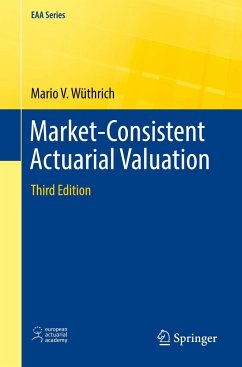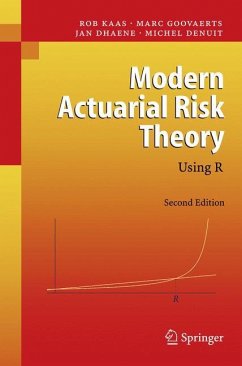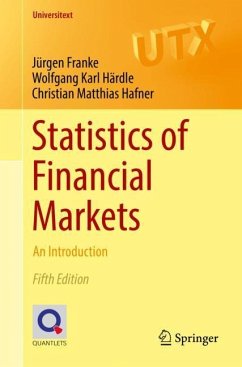
Mathematical and Statistical Methods for Actuarial Sciences and Finance

PAYBACK Punkte
46 °P sammeln!
The interaction between mathematicians and statisticians has been shown to be an e ective approach for dealing with actuarial, insurance and financial problems, both from an academic perspective and from an operative one. The collection of original papers presented in this volume pursues precisely this purpose. It covers a wide variety of subjects in actuarial, insurance and finance fields, all treated in the light of the successful cooperation between the above two quantitative approaches.The papers published in this volume present theoretical and methodological contributions and their applic...
The interaction between mathematicians and statisticians has been shown to be an e ective approach for dealing with actuarial, insurance and financial problems, both from an academic perspective and from an operative one. The collection of original papers presented in this volume pursues precisely this purpose. It covers a wide variety of subjects in actuarial, insurance and finance fields, all treated in the light of the successful cooperation between the above two quantitative approaches.
The papers published in this volume present theoretical and methodological contributions and their applications to real contexts. With respect to the theoretical and methodological contributions, some of the considered areas of investigation are: actuarial models; alternative testing approaches; behavioral finance; clustering techniques; coherent and non-coherent risk measures; credit scoring approaches; data envelopment analysis; dynamic stochastic programming; financial contagionmodels; financial ratios; intelligent financial trading systems; mixture normality approaches; Monte Carlo-based methods; multicriteria methods; nonlinear parameter estimation techniques; nonlinear threshold models; particle swarm optimization; performance measures; portfolio optimization; pricing methods for structured and non-structured derivatives; risk management; skewed distribution analysis; solvency analysis; stochastic actuarial valuation methods; variable selection models; time series analysis tools. As regards the applications, they are related to real problems associated, among the others, to: banks; collateralized fund obligations; credit portfolios; defined benefit pension plans; double-indexed pension annuities; efficient-market hypothesis; exchange markets; financial time series; firms; hedge funds; non-life insurance companies; returns distributions; socially responsible mutual funds; unit-linked contracts.
This book is aimed at academics, Ph.D.students, practitioners, professionals and researchers. But it will also be of interest to readers with some quantitative background knowledge.
The papers published in this volume present theoretical and methodological contributions and their applications to real contexts. With respect to the theoretical and methodological contributions, some of the considered areas of investigation are: actuarial models; alternative testing approaches; behavioral finance; clustering techniques; coherent and non-coherent risk measures; credit scoring approaches; data envelopment analysis; dynamic stochastic programming; financial contagionmodels; financial ratios; intelligent financial trading systems; mixture normality approaches; Monte Carlo-based methods; multicriteria methods; nonlinear parameter estimation techniques; nonlinear threshold models; particle swarm optimization; performance measures; portfolio optimization; pricing methods for structured and non-structured derivatives; risk management; skewed distribution analysis; solvency analysis; stochastic actuarial valuation methods; variable selection models; time series analysis tools. As regards the applications, they are related to real problems associated, among the others, to: banks; collateralized fund obligations; credit portfolios; defined benefit pension plans; double-indexed pension annuities; efficient-market hypothesis; exchange markets; financial time series; firms; hedge funds; non-life insurance companies; returns distributions; socially responsible mutual funds; unit-linked contracts.
This book is aimed at academics, Ph.D.students, practitioners, professionals and researchers. But it will also be of interest to readers with some quantitative background knowledge.













